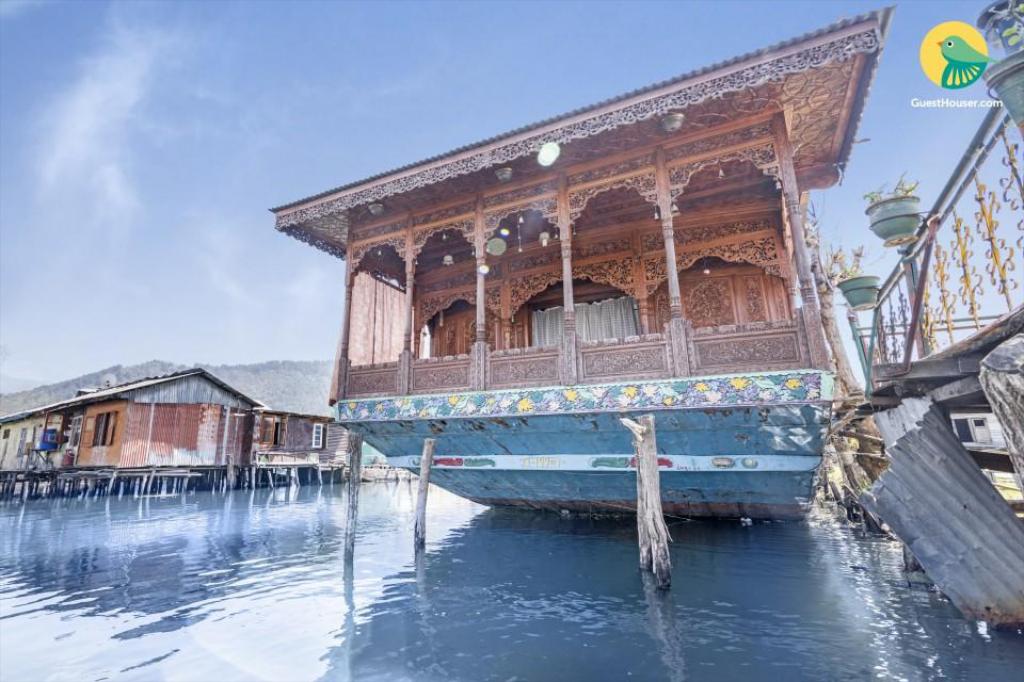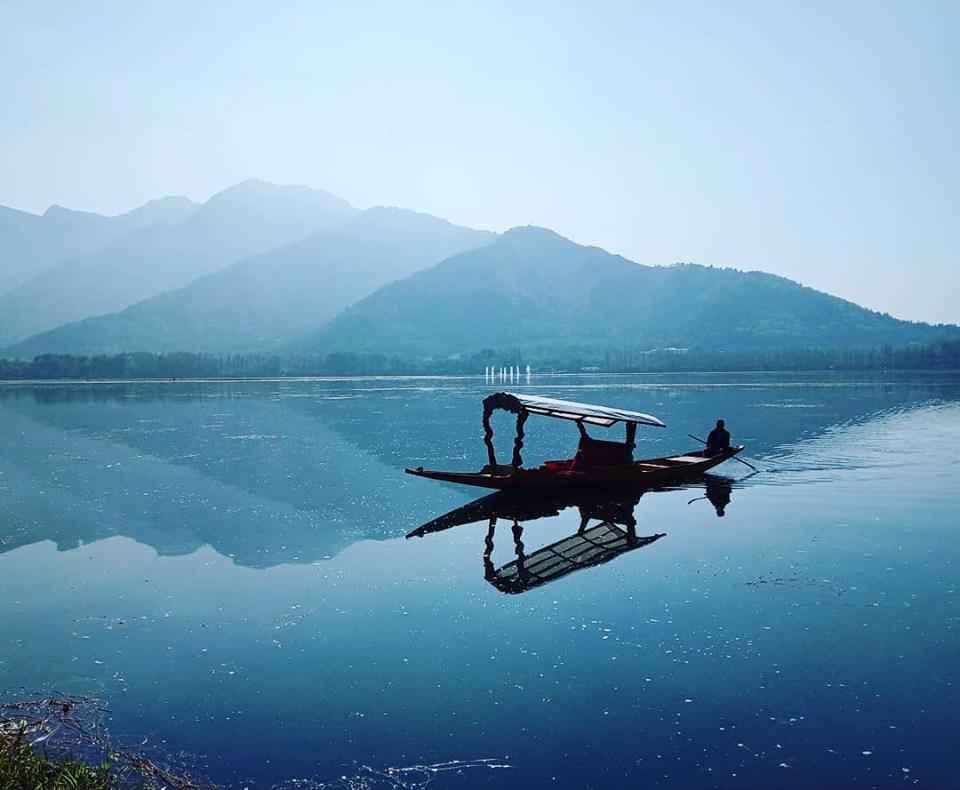The Ghat of the Gloomy World

Badar Bashir is a Srinagar-based scribe who writes about travel…
Once clogged by tourists, now lost in poverty. The people of Dal Lake are left with nothing but empty pockets in another lockdown.
A white bird ‘gull’ sits undisturbed in the Dal Lake on one of the vertical beams of wood. Silent, he pushes the beam and hits the air willfully. An old man sitting without humour, in the middle of the lake, throws bait into the water from the shaft of his boat.
He waits for fish to come, while a man sitting on the banks of the lake watches him pensively expecting a catch. Houseboats are empty, so is the lake and so are the apprehensions of the arrival of tourists amid the second viral wave.
A young boy sits by the balcony of his houseboat, idle, watching the other lesser idle men hitting the nail on their boat.
The boat belongs to Gulzar Ahmad, who is in his late 40s. His beautiful houseboat has four rooms with a balcony housing some chairs.
“Before these back-to-back lockdowns [third since 2019], we were happy because we could make our ends meet,” Gulzar, sitting on one of the chairs of his balcony, says with a sad face.
Support Our Journalism
You are reading this because you value quality and serious journalism.
But, serious journalism needs serious support. We need readers like you to support us and pay for making quality and independent journalism more vibrant.
“And then the government doled out the advisory [in the run-up to abrogation of Article 370], advising tourists to leave the valley. It was unclear what it meant to be, and people started leaving frantically. They sought departure as soon as they heard of it.”
The crippled life since then has taken a huge toll on the lake-people. From well-to-do, most of them have now become poor. Some have even sold their copper utensils to survive the ominous lockdowns, continues Gulzar, up-stretching the corners of his lips, with despair falling on his face.
“Kashmir is the favorite place of foreign tourists. When they come here, they become enticed with the Dal Lake. They want to spend time on the floating houses of the lake,” the houseboat owner says.
Before these recurrent lockdowns, Gulzar had hosted a foreign lady ‘Mary’, who wanted to see and explore Kashmiri culture and tradition.
“She had been to trekking before she came here and her first preference to spend the last days of vacation was in a houseboat,” he says.
Mary would wake up early in the morning and come out on the balcony with her book. The next few hours would be spent reading and sunbath. She would enjoy the soothing surroundings and the reflection of sweet dapples created by the sun, Gulzar recalls. “She would also say that Kashmir is the most pristine place I have ever seen.”
But then she had to leave in a hurry and the houseboat owner was left with nothing.
It’s for the first time that Gulzar has seen such a prolonged period of lockdown, and such intense fear and hesitancy among tourists for the ‘paradise trips’.
“As nobody was visiting our place when the lockdown was first imposed in 2019, we were left to fend for ourselves,” the houseboat continues on his deserted deck.
“Our expenses were cut and the only thing we would wait for was the end to lockdown. With each passing day, we became poorer. My savings were stripped and I had nothing to do.”

Gulzar had never thought that he could possibly see such a phase of his life when he would have to sell the jewelry of his wife to pay for his expenses.
“When that first lockdown was eased out, we thought this could end our sufferings but then again we were incarcerated within our own boundaries, after the news of the pandemic broke. And since there was no package from the government either, our sufferings continued.”

As the lockdown has made the lake lifeless again, Javed reaches to quay early morning, parks his Shikara, and waits for the customers. But the 21-year-old boy’s wait lingers on.
“We’ve survived for hundreds of days without tourists,” boatman Javed says.
“Some of us who feel that we may die of hunger and poverty go out and scream to bring customers, screaming to people to come and have a Shikara ride convinces us that we are alive.”
It was after Javed’s father acquired illness of certain strength, that he had to fill the position of his ailing headman. He had to start earning to get his elder sister betrothed and married.
“I once decided to halt my studies and then prepared myself for the imminent shift to my life,” he says. “I took to ferrying people on the lake. It was a good feeling that I will start earning by myself, that I will become mature, and I might even learn to be responsible.”
He would daily earn more than Rs 1200 till the community had the complete rupture due to the lockdowns.
“I did not have any time to despair for my studies, rather I was preparing for my sister’s marriage,” the fresh-faced boatman says.
“We had prepared everything to the brim, but then everything changed. We were put under lockdown. No man could be seen strolling on the Boulevard and tourists were hurdling to leave this place.”
When everything was shut Javed had to call off his sister’s marriage. There was nothing, he says, he could know about the happenings.
“We were all stuck. Our phones were defunct. Network was nowhere discernible for around three months. No possibilities of a tourist enquiring about our functioning. None could make a call outside and advertise about our offers. But even if we did that we were not allowed to park our Shikaras. We were incarcerated in our own places, spurring a perception amongst ourselves that they’re making Kashmir an open prison.”
Look at Abdul Samad, continues Javed, pointing towards his community member.
“This man has three daughters, an old mother, and a divorced sister. His income is almost hand to mouth. It has been a long time since he quit coming here. He sold barbeques on Boulevard during the lockdown. Had he hooked onto the same job, his family would have hungered and collapsed.”
But everyone is not like Samad.
He could switch to a different occupation, Javed says, others don’t conceive anything except tourists.
“Either we host tourists and earn, or else we sit back hungering and thirsting, patient and hopeful. But this time lockdowns have tested everyone’s patience. Most of us couldn’t stand the turmoil and either we are selling valuable things of our home one by one or we ask our friends for help, financial help.”
During the traumatic lockdown period, Javed’s mother suffered a breakdown. She developed severe blood pressure issues.
“It took us many troubles first to reach the hospital. Everywhere it was barricaded and haunting. We had to admit her for fifteen days. Without any income, it was an unexpected event that fell on us which drained us of almost every penny,” he says in agony.
Javed was in desperate need of money.
After selling all the valuables in the home, he ventured to sell his Shikara. But who would buy it when all the lake was shut, when there was no tourist, and when he would earn nothing over his investment.
“My sister’s wedding was supposed to be a big event, but we have to wait now till we recover from this economic mishap,” Javed says. “We don’t know what to do next. We don’t have any other skill to get ourselves employed.”
But there was a time when boatmen would be pedaling their oars in the midst of Dal Lake ferrying different tourists — one would dismount, another would be ready.
Now, in Kashmir’s third straight year of lockdown, these peddlers sit idle from morning to evening and go home empty pocket, not knowing what fate has for them.
“There were some expectations at the start of 2020 but we lost them too when the virus struck us,” the young boatman laments.
“Nobody wanted to interact with another person. We were left more isolated. We were ghosted by silence,” Javed says.
“At the beginning of 2021, a fleeting tourist footfall returned only to be driven out by this virus. I don’t know what will happen if we’re left unattended.”

Meanwhile, on his deck overlooking the desolation of the lake, Gulzar is still talking about Mary and many others who would come and make the lake lively with their adventurous trips.
“Since these lockdowns, we’ve been sitting, and there isn’t anything we can even expect of,” he rues. “Every expectation seems obsolete.”
Directing his finger towards a hawker named Irfan, Gulzar says the young man would take photos of tourists and sell them and earn his living.
“But now he goes to sell his labour but unfortunately, they underpay him,” the houseboat owner says.
“There’s another person I know of and he has started selling barbeques on the Boulevard, is that how we should live?
“People grow and their businesses become bigger with time but we keep on going backward. The predicament is we’ve forethought ourselves in only in tourism, doing the job that we have always been doing. So whenever tourists stop coming here, we’re the first causality. We’re left to fend for ourselves. There isn’t even any package from government to keep us buoyant, nobody thinks of us.”
Undoubtedly, the Ghats of the Dal Lake today open into the gloomy world.
Once clogged by tourists, the place is now lost in poverty. The people of the iconic lake are left with nothing but empty pockets, and every day leading to bleaker tomorrow. The sun on the lake sets with despondency now.
Mountain Ink is now on Telegram. Subscribe here.
Become Our Ally
To help us strengthen the tradition of quality reading and writing, we need allies like YOU. Subscribe to us.
Badar Bashir is a Srinagar-based scribe who writes about travel and tribes.










